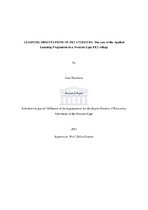| dc.contributor.advisor | Groener, Zelda | |
| dc.contributor.author | Hamman, Liza | |
| dc.contributor.other | NULL | |
| dc.contributor.other | Faculty of Education | |
| dc.date.accessioned | 2013-07-17T07:49:54Z | |
| dc.date.available | 2013/01/25 09:37 | |
| dc.date.available | 2013/01/25 | |
| dc.date.available | 2013-07-17T07:49:54Z | |
| dc.date.issued | 2011 | |
| dc.identifier.uri | http://hdl.handle.net/11394/1653 | |
| dc.description | Magister Educationis - MEd | en_US |
| dc.description.abstract | This study investigated the reasons why FET part-time students enrolled at a FET college by examining their learning orientations. Guided by the literature, the focus was on the vocational orientation to learning and orientations to learning were further investigated within the vocational orientation based on orientations developed for part-time students found in the literature. In addition, it was investigated whether students' expectations have been met and if they were satisfied with the college experience. Lastly, the study examined the relevance of college learning to the world of work and the contribution it made to the career development of learners in a globalising world. The research shows that part-time students enrol at FET colleges predominantly for vocational reasons and the majority of the students were enrolled in order to advance their careers and associated with a vocational orientation to learning. However, it emerged that reasons for learning within the vocational orientation to learning are often multi-faceted and complex. The most important findings are 3 new learning orientations for part-time students that were identified: 'education for a qualification', 'education for adults who previously made the wrong choice' and 'education for adults as a model for their children'. Furthermore, the findings indicate that learners were satisfied with the programme they were enrolled in because they believed that the qualification would enable them to achieve their vocational aims which were primarily to find a new job, to be promoted and to increase their income. The findings suggest that the programme that was examined was relevant to the world of work, promoted employability and that it made a significant and important contribution to students' career development in a globalising world. | en_US |
| dc.language.iso | en | en_US |
| dc.publisher | University of the Western Cape | en_US |
| dc.subject | Further Education and Training | en_US |
| dc.subject | Vocational education | en_US |
| dc.subject | Adult learning | en_US |
| dc.subject | Globalisation | en_US |
| dc.subject | Part-time students | en_US |
| dc.subject | Student orientations | en_US |
| dc.subject | Learning orientations | en_US |
| dc.subject | Motivational orientations | en_US |
| dc.subject | National Qualifications Framework | en_US |
| dc.subject | Employability | en_US |
| dc.title | Learning orientations of FET students: the case of the Applied Learning Programme in a Western Cape FET college | en_US |
| dc.type | Thesis | en_US |
| dc.rights.holder | University of the Western Cape | en_US |
| dc.description.country | South Africa | |

